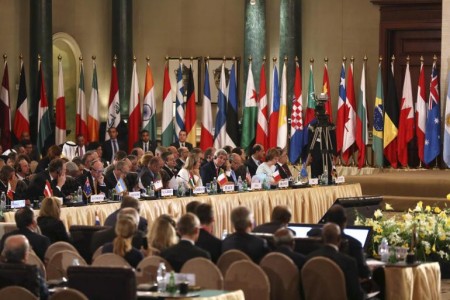Gaza has disappeared from the headlines, following the 50-day war with Israel this summer, but its problems remain.
Foremost among these, as the Israeli siege continues, is how the territory will recover from the damage of the conflict. On Sunday, an international “donors” conference considered the situation:
Benjamin T. Decker, a Tel Aviv-based geopolitical security analyst, writes for EA:
Who are the Major Players?
The Reconstruction Conference marked Egyptian President Abdel Fattah El Sisi’s first major regional policy initiative, as he invited representatives from 50 countries and 20 international organizations to come meet in Cairo, nominally in support of a Palestinian “unity government” which was formed in June 2014 by the Gazan leadership of Hamas and the West Bank leadership of the Palestinian Authority.
In his opening speech, Sisi said reconstruction was dependent on a “permanent calm” between Hamas and Israel, which in turn would require the Palestinian Authority and its leader Mahmoud Abbas to exercise full authority over both the West Bank and the Gaza Strip.
The conference, which raised a total of $5.4 billion USD, was co-chaired by the Norwegian Foreign Ministry. Those attending included US Secretary of State John Kerry, UN Secretary-General Ban Ki-Moon, and representatives from all 21 Arab League states, European Union countries, and Russia.
Israel was asked to stay away, and neither Gaza’s Hamas or Islamic Jihad received invitations.
The Gulf States showed their oil wealth to offer the largest contributions, with $1 billion from Qatar, $500 million from Saudi Arabia, and $200 million from the UAE. The US pledged $212 million in immediate financial aid, bringing its total commitment to approximately $400 million this year. EU member states offered $568 million, and Turkey pledged $200 million USD.
Russia did not put a price tag on its support. Instead, Foreign Minister Mikhail Bogdanov offered to back the Palestinian draft resolution at the UN Security Council, establishing a timeline for Palestine’s independence.
Where Will The Funds Go?
Norwegian Foreign Minister Borge Brende, co-chairing the conference, said $2.7 billion will be directly allocated to reconstruction; however, it is unclear how the remainder of the money will be distributed. Donors will send the money through the Palestinian Authority in an effort to bypass Hamas, whose political wing is not represented in the recently-convened unity government.
Palestinian Authority President Mahmoud Abbas pledged that he would coordinate with the UN to maintain responsibility and transparency throughout the process. The commitment responds to allegations that Gaza’s Hamas leadership used millions of dollars in international aid, since it took control of the territory in 2006, to construct a complex network of underground tunnels — including those used to launch attacks against Israel.
Abbas pledged that the majority of money will be used to rebuild neighborhoods which were destroyed by the Israel Defense Forces this summer, seeking to rehouse some of the 100,000 people who remain homeless. US Secretary of State John Kerry said that America’s $200 million will be for security and economic development, including water and sanitation projects.
The Palestinian Unity Government
The Palestinian unity government, announced in June 2014, met for the first time on October 9, three days before the Cairo conference. During the meeting, the 17-member Cabinet discussed comprehensive plans for reconstruction of the Gaza Strip, with Prime Minister Rami Hamdallah meeting Palestinian businessmen.
The absence of Hamas officials from the key positions in the unity government can be read as an effort by the Palestinian Authority to garner increased support from the international community, as well as Abbas’ efforts to consolidate his control with appointments for his allies.
However, Hamas’ pursuit of the 50-day war with Israel has increased its popular support within the West Bank, many in the Gaza Strip remain supportive of the leadership for its resistance to the Israelis.
The Demilitarization of the Gaza Strip
The transfer of control over Gaza’s border crossings to the Palestinian Authority underscores the international concern over Hamas’ involvement in any security issue. For Israel, the delivery of aid and passage of convoys into the Gaza Strip will be contingent on the demilitarization of the Gaza Strip.
Problems are likely to arise, hindering the commitment to reconstruction. Hamas and the Palestinian Authority are unlikely to coordinate efforts, with the Gazan leadership unwilling to relinquish its role in internal security organizations.
The Cairo conference offered a signal of those problems. Deputy Prime Minister Mohammad Mustafa said the Presidential Guard will deploy to the border crossings over the coming days, but Interior Ministry Undersecretary Kamal Abu Madi said an agreement had yet to be reached.
Tension could be defused if Hamas chooses to give up security to the Palestinian Authority and refocus on social programs, hoping to boost its popularity ahead of Parliamentary elections scheduled for the end of 2014 with the promises of rebuilt home and economic opportunity.
However, even if Hamas took this path, other Gazan groups, such as Islamic Jihad and the Palestinian Popular Resistance Front, may try to sabotage the Palestinian unity government and hinder the international efforts.
Renewed Peace Talks with Israel?
All conference participants may have called for a resumption of negotiations between the Palestinian Authority and Israel, but the Israeli absence highlighted the distance between the parties.
Egyptian President Sisi urged Israel to reconsider the Arab League initiative first presented in 2002, a call echoed by the Palestinian Authority’s Mahmoud Abbas. But senior Israeli officials, rather than responding directly, continued to hold out the threat of Hamas and its resumption of rocket manufacture.
Foreign Minister Avigdor Lieberman called for the incorporation of the Arab League into future talks, while asserting that Gazan reconstruction cannot move forward without Israel’s cooperation. Centrist Justice Minister Tzipi Livni called for increased regional cooperation in the areas of security, economy, and diplomacy.

